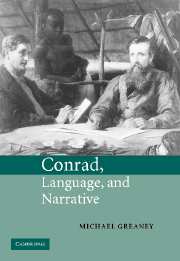Book contents
- Frontmatter
- Contents
- Acknowledgements
- Introduction
- PART I SPEECH COMMUNITIES
- PART II MARLOW
- PART III POLITICAL COMMUNITIES
- 7 Nostromo and anecdotal history
- 8 Linguistic dystopia: The Secret Agent
- 9 ‘Gossip, tales, suspicions’: language and paranoia in Under Western Eyes
- Conclusion
- Notes
- Bibliography
- Index
8 - Linguistic dystopia: The Secret Agent
Published online by Cambridge University Press: 22 September 2009
- Frontmatter
- Contents
- Acknowledgements
- Introduction
- PART I SPEECH COMMUNITIES
- PART II MARLOW
- PART III POLITICAL COMMUNITIES
- 7 Nostromo and anecdotal history
- 8 Linguistic dystopia: The Secret Agent
- 9 ‘Gossip, tales, suspicions’: language and paranoia in Under Western Eyes
- Conclusion
- Notes
- Bibliography
- Index
Summary
According to Geoffrey Galt Harpham, The Secret Agent is ‘the first, and really the only, written text in Conrad's entire oeuvre’. One might object that all Conrad's tales are, willy-nilly, ‘written’; but, prior to The Secret Agent, Conrad's fiction is dominated by the ‘writing of the voice’. Even Nostromo, with its string of references to the folk legends of Azuera and its lengthy quotations from Captain Mitchell's anecdotes, betrays a lingering formal affiliation to oral tradition. Uniquely, however, The Secret Agent has no recourse to the utopian myths of transparent communal discourse that sustained the earlier fictions. The tone of impersonal irony that prevails in The Secret Agent is a far cry from the cosy atmosphere of ‘Youth’ or Lord Jim, where the reader automatically qualifies as an honorary listener, invited to pull up a chair with Marlow's friends and enjoy a good after-dinner yarn. The utopian dimension in Conrad's fiction previously extended into his conception of the relationship between text and reader, a relationship to which Conrad hoped to restore some of the direct intimacy of that between storyteller and listener. As Conrad's fiction became more sophisticated, however, it became less hospitable. Growing in creative power and ambition, he felt less need of the enabling fiction of a storytelling situation; the novels he composed at the height of his powers – Nostromo, The Secret Agent, Under Western Eyes – make the fewest concessions to the general reader.
- Type
- Chapter
- Information
- Conrad, Language, and Narrative , pp. 135 - 151Publisher: Cambridge University PressPrint publication year: 2001

